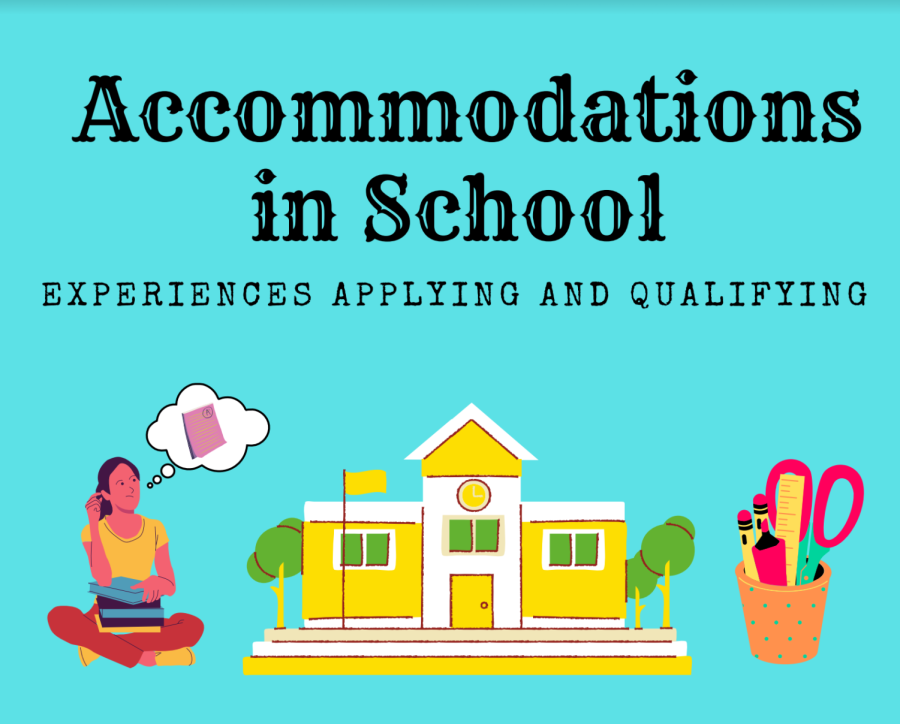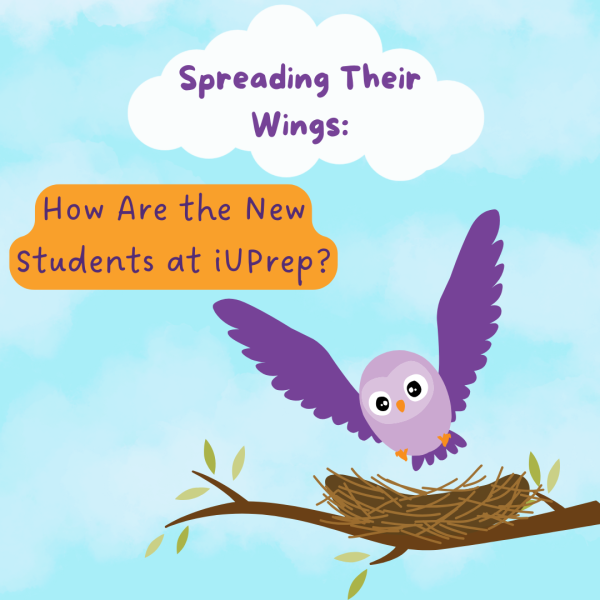THE ISSUES WITH ACCOMMODATIONS
Exploring the Issues of Accommodations… iUPrep Interviews Included!
Most schools in the United States of America offer some variety of accommodations to students that struggle with disorders and deficits that may affect performance in a traditional school setting. While this is certainly a necessary system to make it possible for everyone in need to get an education, there are many issues that need to be solved in order to fully meet the needs of every student and encourage them to take advantage of systems designed to help level the playing field.
While change is needed for improvement, one thing that the accommodation system does well is acknowledging the fact that not every student is suited to learning in the same environment. The attempt to be inclusive through accommodations in and of itself is a good quality of the system. This being said, the way in which these accommodations are presented and the specific methods available cause them to be rarely utilized.
The first reason that accommodations are not being utilized to their full extent is the fact that many students are not even made aware of their existence. Unless a student explicitly asks about accommodations for the classroom or testing, available accommodations are very rarely talked about. Neurodivergent students, or students whose brain functions differently from what is considered typical (ADHD, ASD, etc.), may be struggling with coursework in a traditional environment and are missing out on benefits that they may be eligible for simply because they do not know about them. Information about requirements for classroom accommodations is difficult to find and varies across the United States, making them difficult to pursue. The only way to fix this particular issue is making information about the availability of classroom accommodations more publicly known so that they are given to the student rather than the student having to search for them.
The second issue with accommodations is that the current solutions proposed attempt to act as a blanket solution when they may not be effective for everyone. For example, a common accommodation for students with ADHD is time extensions or isolation from other students in testing and other assignments. Attention-deficit/hyperactivity disorder, or ADHD, is a common form of neurodivergence that is commonly displayed through short attention span, hyperactivity, fidgeting, and difficulty focusing. While many students have ADHD, it certainly does not affect them all in the same way. Some people with ADHD can cope with difficulty focusing in the presence of complete silence while many others need some sort of background noise in order to perform at their best. Some may be benefitted by extra time, others may only get distracted during their extra time. Rather than isolating a student from others and making them feel ostracized, they could possibly be provided with headphones for white noise or music while working to help them focus and drown out distractions while keeping them inside of the classroom. Rather than adding extra time, a student could possibly be given a halfway break, or a clock as a reference to better manage their time. In summary, rather than treating one particular disorder with one or two different accommodation options, those assigning accommodations should focus more on what will best help the individual rather than trying to find one all-encompassing solution.
The final issue with classroom accommodations is the negative stigma that is associated with neurodiversity and the resulting need for extra help as well as the desire to be independent. One of the main reasons that students frequently turn down accommodations that they qualify for is the desire to be self-sufficient. They may feel that their education is less valid than that of neurotypical students (students whose brain function is considered typical) because they received provisions that the others did not. To fix this issue, it should be ensured that part of the implementation of these accommodations is teaching the student how to make use of tools to create a better learning environment for themselves on their own rather than doing all of the work for the student. This will deliver a feeling of self-sufficiency and adequacy for the student. In addition, an important issue to be addressed is the stigmatization or commonly held negative preconceptions associated with the need for these accommodations. Many students refuse accommodations that could be helpful to them because they are afraid of the preconceived notions associated with asking for extra help. It should be taught and reinforced that a student is not any less intelligent because of their need for a different type of learning environment. Traditional schooling is not a one-size-fits-all system, and having a brain that doesn’t function well under the same circumstances as others is not something to be ashamed of. Whether or not a student is neurotypical does not speak to their intelligence or capability in general, but instead, to the fact that their brain just works in different ways that may make them exceptional at some things and struggle more than average with others.
By making the existence of classroom accommodations well known, not generalizing the assistance needed by neurodivergent people, and normalizing the need for a different environment than the average to thrive, schools will provide students with much better access to an education that serves all.
IUPrep Interviews
We interviewed 2 iUniversity Prep students and an iUP alumna to get their take on accommodations.
iUP alumna, Sarah Jagnow, qualifies for accommodations because of her ADHD. However, she chooses to not apply for these accommodations. Having ADHD qualifies her for having extra time for assignments and the ability to test alone in a separate room. She looked into accommodations briefly for college, but she ultimately decided not to apply for/use them. She says that the main reason for not taking advantage of her accommodations is that she is stubborn. She “didn’t want her success to be reliant on having accommodations.” Additionally, she did not think that the accommodations would not benefit her. She said that having more time on assignments, for example, might actually hurt students with ADHD because it would just allow them to procrastinate more. Having ADHD makes it where Sarah has a harder time with reading comprehension, interpretation of figurative language, etc. For example, when there are open-answer questions or ambiguous questions, she may interpret them in the incorrect way. Having extra time on an assignment will not help with that. Although Sarah did not personally think the accommodations will help her, she says that “if someone thinks accommodations will help them, then it isn’t a bad thing to use them.”
Two anonymous students at iUP have accommodations that they have applied for and have used. The first student has ADHD, dyslexia, and dysgraphia. He qualifies for extra time on assignments and tests, can type things even if it is required to be hand-written, is given pre-made notes, can take breaks as needed, can leave a class whenever he needs to, and has someone to bubble in his answers on tests. Although many of these accommodations are not needed in an online environment, he used all of them at his past schools and will be able to use them once he is in college. He says that “iUP accommodates some of these things naturally.” Unlike Sarah, he did not have an option to decide if he wanted to take advantage of his accommodations or not because his psychiatrist said that he had to. He noted one downside to having accommodations: people without accommodations are often jealous. As a result, his accommodations were actually revoked once in elementary school.
The last student interviewed has chronic migraines, depression, and anxiety. He qualifies for having extra time on assignments and personalized learning plans. At in-person school, he was also allowed to leave class to go to the nurse, counselor’s office, or a specific teacher at any time. If he was absent for long periods of time due to chronic migraines, he was exempt from late grades. The reason he decided to apply for accommodations was that he got really behind in school. He noted that he hasn’t used his accommodations at iUP because “the whole system is an accommodation.” However, he did take advantage of them when he attended in-person school. Lastly, he mentioned that it can be hard to get the accommodations that you apply for, especially “if you don’t have the right therapist.” One downside is that “the schools can actually decide which accommodations they want to give you, even if you qualify for it.”
Many students are in similar situations to that of the students interviewed. Some may not even be aware that they are eligible for accommodations, which is why it can be vital that students are educated and provided with resources to know what they qualify for. Deciding on whether or not to apply for accommodations may be a conundrum for some students, but ultimately, it is important to do what is best for your specific situation. By understanding what you qualify for and how you can take advantage of them, it can aid you in making the decision that is best for your education and your future.
(*Body Paragraphs done by Harrisen Smith, Inteviews by Makenna Horne*)
Citations
Barriers to accommodations for students with … – ed. (n.d.). Retrieved April 11, 2022, from https://files.eric.ed.gov/fulltext/EJ1236832.pdf
Section 504 of the Rehabilitation Act of 1973 – Pacer Center. PACER Center – Champions for Children with Disabilities. (n.d.). Retrieved April 11, 2022, from https://www.pacer.org/parent/504/?gclid=CjwKCAjwo8-SBhAlEiwAopc9W_YZ1NPf8kRQtyb1Eze4XVRUucXpIMyMTg_BspLDaHpD43ItlcGepRoCM_sQAvD_BwE
Texas Education Agency. (2022, February 1). 2021–2022 Accommodation Resources. Texas Education Agency. Retrieved April 11, 2022, from https://tea.texas.gov/student-assessment/testing/student-assessment-overview/accommodation-resources

My name is Makenna Horne and this is my 6th and final year at IUP! This is my 2nd year in iHoot and I’m so happy to be a part of the BOE! I love doing...

Hello, my name is Harrisen Smith and I am in 12th grade at iUniversity Prep. This is my third year as an online student. In my free time,...

Hello everyone! My name is Alessandra Gonzalez and I am an eleventh-grader at iUniversity Prep. This will be my 5th year attending online school. I love...













Eve Bamber • Apr 27, 2022 at 1:19 pm
Such an insightful and well-written article tackling a very important topic. Fantastic job Makenna & Harrisen! Can’t wait to read more from you both!
Makenna Horne • Apr 27, 2022 at 3:05 pm
Thank you Eve!!